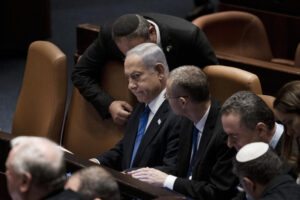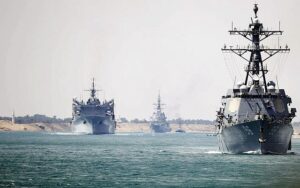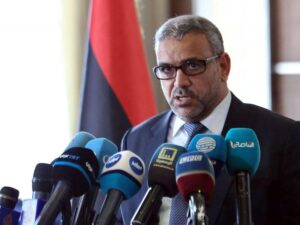
The National Interest Foundation Newsletter
Issue 202, August 11, 2023
Welcome to our NIF Newsletter. In this week’s headlines: we explore what is driving the growing divide in Israeli society, analyze the recent deployment of U.S. troops to the Persian Gulf, and look into how the election of a new leader to Libya’s High State Council will affect negotiations.
Written by Jacob Van Veldhuizen
Division Grows in Israeli Society

Division in Israel is mainly driven by political differences, especially concerning the recent gutting of the Israeli Supreme Court. (Photo from AP)
Division Continues to Deepen Among Israelis
A recent poll released by the Pew Research Center shows increasing polarization in Israeli society. The two main indicators of this division are political and religious ideologies. This poll covered many questions concerning both, but among the most important were views about Prime Minister Benjamin Netanyahu. 52% of Israelis had an unfavorable view of Netanyahu, while 47% had a favorable view. The poll also indicates a growing division between the political left and right in Israel. 75% of Israelis polled saw strong conflicts between the two groups. This political division is growing with little chance of reconciliation, and trapped in the middle of it are the Palestinians.
It is of note that younger Israelis are more likely than old Israeli to see strong societal conflicts. 18–29-year-olds were most likely to see strong societal conflicts across a range of groups, including between those who are religious and non-religious, Arab and Jewish, and left and right political leanings. This higher percentage of younger people is more likely to see strong societal conflicts. The Israeli military has compulsory military service for all Israeli citizens, with some exceptions. A high percentage of those serving in the military are between the ages of 18 and 29. This data point substantiates a recent string of letters signed by thousands of Israeli service members pledging to not show up for duty if Netanyahu’s law dismantling judicial checks is passed.
This internal conflict will likely come to a head when the supreme court rules on a law that will limit its power. The Israeli Supreme Court is currently in a very difficult position. If they allow Netanyahu’s coalition to gut the courts, they will have unchecked power to pass laws further discriminating and brutalizing Palestinians. This will escalate tensions and almost certainly lead to a confrontation between the two sides. If they decide to block the law, the coalition could simply ignore the ruling, throwing Israel into a constitutional crisis.
The Palestinians will be negatively affected no matter the ruling of the supreme court. At its roots, this conflict is between those who favor the secular, 1967 brand of Zionism or the current, more extreme brand. This being said, the former is the better of the two, but it is still apartheid. The situation in Palestine is becoming increasingly dire. The far-right extremist government allows and even supports the murder of Palestinians by illegal settlers in the West Bank. The recent killing of Qusai Jamal Maatan is just the latest example of the impunity Israeli settlers have to attack and kill Palestinians.
This poll confirms what many observers have said, there is a deep division among Israelis. This division continues to grow by the day as the gap between the political left and right continues to widen. This growing crisis also has the potential to leave Israel in a highly vulnerable position and gives critics ammunition to argue their points. If the judicial law passes, it will be increasingly difficult to sell the idea that Israel is the only democracy in the Middle East, which was a false statement, to begin with. Blind support for Israel is still the norm among the U.S. Congress, but this sentiment is beginning to change among the American public. A 2023 poll by Gallup indicates waning support for Israel and growing sympathy toward Palestinians. Due to the entrenched nature of American politics, a switch in policy is unlikely to take place in the near or even far future, but the internal conflict in Israel may expedite this change.
This poll also indicates that the growing divide between the left and right in Israel will not disappear anytime soon. It is more likely that it will escalate. The extent of this escalation is unknown, but some commentators warn that a civil war may be on the horizon. With hundreds of thousands protesting against Netanyahu and his coalition and refusal to serve by a large number of reservists, this may not be too outlandish of a prediction. It also appears unlikely that either side will back down. Netanyahu is not willing because of his desire to escape pending corruption charges, which this new law will aid. The passage of this law is also a conditional requirement to maintain support from his government coalition. If Netanyahu backs down, his government will quickly collapse. The people are unwilling because this law will dismantle the checks that keep the Knesset from holding absolute power over Israel. Many of the laws already proposed will harm both residents of Israel and occupied Palestine. Israel’s current political crisis is escalating at breakneck speed without safety rails or breaks. A confrontation is certain. The extent of this will be determined by the actions of the supreme court and military reservists.
Deployment to the Persian Gulf

The recent decision to deploy more U.S. troops to the Persian gulf will raise tensions between the United States and Iran. (Photo from AP)
The American Military Deployment in the Gulf Raises Tensions in the Region
The United States’ recent deployment of ships, aircraft, and troops to the Persian Gulf has the potential to push tensions to a boiling point in the region. This new strategy being implemented by the Biden administration runs contrary to multiple U.S. administrations (including his own) stated intention to decrease the U.S. footprint in the Middle East. Deploying more forces is an unnecessary escalation. There are other options that the United States needs to explore before they even begin to consider increasing its presence in the Middle East.
The stated reason for the deployment is to deter Iran’s recent seizure of some oil tanks transiting the Strait of Hormuz. Iran began to seize other nations’ oil tankers in reaction to the United States doing the same to prevent Iranian oil exports. Not only is this a violation of international law, its implementation was doomed to lead to further escalation. Now the United States cries foul and proceeds to once again escalate a situation that was created by its policies.
The Biden administration is currently considering placing armed U.S. military personnel aboard commercial vessels, something it has not done since World War 2. Doing this not only needlessly risks American lives, but also increases the potential for this limited tit-for-tat exchange to escalate into a much larger conflict. There are also still important questions about the implementation of this policy. The vessels to be protected by this policy are commercial operations with mostly non-U.S. crews and owners. Enacting this policy will do what has become increasingly more common in American politics. It will put the interests of corporations over the interests of Americans.
This policy also has the potential to step on the toes of U.S. partners in the region. The countries have made great strides in decreasing tensions between Iran and their respective countries. To barge in and invalidate all efforts toward de-escalation would be irresponsible and unwise.
Increasing military presence in the Persian Gulf is not the solution. Many other avenues have not been fully exhausted, including multiple diplomatic options. The easiest way to decrease tensions between Iran and the United States would be to simply return the stolen oil tanker the U.S. government seized in April. This would not solve the problem by any means, but it would be an act of goodwill that could create opportunities for new diplomatic approaches. There are still some downsides to this approach. It would create the perception that Iran “won” this exchange and negatively affect our relationship with other countries in the Middle East, including Saudi Arabia. However, this perception is not worth the risk of an incident involving an exchange of fire between Iranian and American forces. If an American or Iranian casualty were to result from this, it would push both sides toward greater military escalation.
This policy is also shortsighted. The end goal is to stabilize oil prices, which it might do in the short term, but the widescale conflict it could start would destabilize oil prices far more than a few seized oil tankers. There are also ways for the United States to save face, including the application of further sanctions. The Biden administration is approaching the issue of Iran’s harassment of oil tanks as if military escalation is the only solution. It is not. The United States should first carefully consider the effects implementing this policy could have on the region and instead explore alternatives that could benefit both the United States and the Middle East.
High State Council Elects New Leader

The election of a new leader to the High State Council in Libya may throw a wrench in ongoing negotiations. (Photo from AFP)
Libya’s New Leader of the High State Council Could Deepen Gridlock
In a close vote of 67 to 62 votes, Mohammed Takala has unseated Khaled al-Mishri as the leader of Libya’s High State Council (HSC). Many observers are concerned that the introduction of a new leader at the helm of a key political institution could hamper ongoing negotiations with the other main political institution in Libya, the House of Representatives (HoR), to hold nationwide elections. Mishri has led the HSC since 2018.
Election discussions are already fragile, with both sides wanting to replace the current interim government in Tripoli. A major reason they are occurring at all is because of pressure from the United Nations. The entire situation remains unstable, just last year, the head of the interim government, Prime Minister Abdul Hamid Dbeibah, had to fight off an armed attempt to remove him from power. Dbeibah is seen by both the HSC and HoR as a political rival. Both the governing bodies are pushing for a new interim government, but cannot agree on rules for an election.
The major concern among observers is the connections between Takala and Dbeibah. Takala was among the supporters of the latter when he was appointed as Prime minister. The former head of the HSC, al-Mishri, favored the creation of a new transitional unitary government. The election of a new leader may also through a wrench in the recently passed plan by the HoR to appoint a new interim government. This plan was supportedby the HSC. A new unity government had the potential to be a catalyst for planning and executing a national election. Now, the HSC’s support of the plan is called into question.
It is also unclear whether the desire to elect a new interim government was driven by a desire to hold elections or animosity towards Dbeibah. Neither side has any motivation to hold elections that would dimmish their power. The sudden change in policy and preference could cause negotiations to fall apart, negating any progress made. This would reconstitute the political deadlock that has plagued Libya since negotiations began in 2020. Takala’s also only achieved victory by 5 points, a thin margin could cause a split within the HSC and further fragment the country.
Adding to the already extremely complicated situation are multiple other actors. Internal actors include warlords that control areas of land. The most powerful of these is Khalifa Haftar, who heads the paramilitary group, the Libyan National Arab Army. External actors include Russia, Turkey, Egypt, the UAE, France, Italy, and Qatar. These countries have consistently fueled the conflict by unilaterally funneling weapons and money into the country to promote their interests. This has been taking place since the war began in 2011 after the overthrow of Muammar Gaddafi. Libya’s vast oil reserves are the primary driver for all this foreign involvement. Supporting the winning side would give the supporting country a leg-up in negotiating oil production. The current volatility of the oil market further motivates countries to become further involved.
The 6+6 Committee, a committee drawn from the HSC and HoR, remains the best hope of creating an environment where national elections can take place in Libya. The 6+6 Committee has recently stated that the rival legislative branches had resolved the key disputes that were preventing a national election from taking place. The introduction of a new leader in the HSC may through a wrench into these plans and move the negotiations back to square one.
